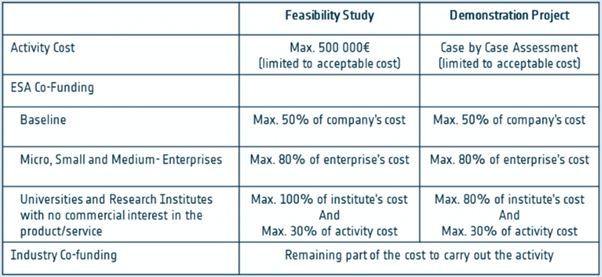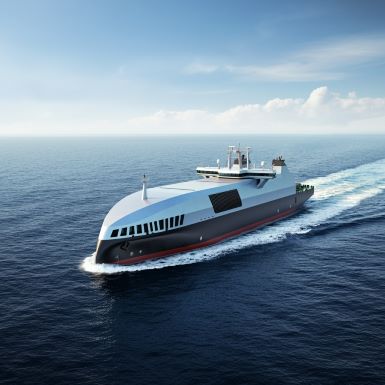FUNDING OPPORTUNITY
This call is part of the umbrella “Maritime Decarbonisation” thematic call for proposals. The objective of this subtheme is to develop new services that support the decarbonisation of the maritime sector through “maritime autonomy”.
While autonomous shipping does not directly achieve decarbonisation, maritime autonomous systems offer transformative opportunities to make the sector cleaner, more energy-efficient, and environmentally sustainable. For example, the reduction or removal of onboard life support infrastructure, opens the door for more compact vessels being able to utilise cleaner and more sustainable energy sources, and unlocks new alternative routes.
This sub-theme includes the following topics. Bidders can propose additional services, not listed below, that contribute to maritime decarbonisation through maritime autonomy.
-
Enhancing the efficiency of autonomous vessels: This involves innovations that utilise space data and technologies to optimise the performance of autonomous systems, resulting in measurable efficiency gains. For example, improvements in autonomous traffic avoidance systems can directly reduce fuel consumption, emissions, and operational inefficiencies.
-
Navigating and overcoming regulatory barriers: Maritime autonomous systems face complex regulatory challenges due to fragmented and evolving legal frameworks. Development of solutions that facilitate compliance with international regulations, standards, and insurance policies with space data will help to enable adoption of autonomous solutions within the maritime industry.
-
Advancing shore-based infrastructure: The successful implementation of autonomous systems must be regarded holistically and not limited to seagoing vessels. Shore infrastructure, including docking facilities within ports and Remote Operations Centres (ROCs), must be modernised to support autonomous operations. This includes the adaptation of port facilities, communication systems, and operational frameworks to fully integrate digitalisation and autonomy, enabling seamless coordination between shore and sea.
-
Protecting autonomous systems from external threats: Ensuring the security and resilience of autonomous systems is essential. This objective focuses on the development of safeguards, including protection measures and countermeasures against threats such as intentional or unintentional jamming of communication or GNSS services, cyberattacks, and physical assaults. Effective solutions will ensure the robustness of autonomous operations in both secure and hostile environments.
-
Supporting the next generation of seafarers (at sea and onshore): Autonomous systems will not replace human workers but will complement and enhance their roles. This call encourages the development of services that leverage space data to facilitate the reskilling of maritime professionals, preparing them for new roles in human-assisted operations. The aim is to place crews in high-value, decision-making positions, both onboard and in shore-based control centres.
-
Increasing autonomy levels: Maritime autonomy is not a binary state, IMO (MSC100/20 add.1) identifies four degrees of automation, ranging from “degree one - Ship with automated processes and decision support” to “degree four – fully autonomous ship”. The objective here is to utilise space data to enable a higher degree of autonomy with a focus on enhancing sustainability, safety, reliability, and scalability of autonomous systems, while ensuring their compliance with international maritime laws.
-
Improving situational awareness for autonomous operations: Autonomous vessels must have a high level of situational awareness to operate safely and efficiently. This objective involves the development of enhanced sensor systems - radar technologies - fused with satellite data to provide real-time monitoring of a vessel’s environment, including nearby ships, weather patterns, and navigational hazards. AI-driven analytics will further improve risk prediction and decision-making.
VALUE OF SPACE
The development of maritime autonomy solutions relies on ubiquitous connectivity, continuous monitoring, and effective situational awareness. Satellite technologies and data have a significant role to play within the proposed services:
- Satellite Positioning and Timing: Like most vessels, autonomous ships rely on GNSS for accurate positioning and timing synchronisation. However, in the case of autonomous ships, advanced GNSS systems (e.g. RTK) may be used for high-accuracy applications such as docking and crane positioning. Alternative space-based satellite positioning (e.g. VDES R-Mode) can also serve as a backup or “watchdog”. Additionally, GNSS reflectometry can be used to determine sea state.
- Satellite Communications: Ubiquitous, resilient, and timely data are critical elements for maritime autonomy. Satellite communications and 5G allow ubiquitous real-time connectivity, securing ship-to-ROC as well as timely updates to navigational information, weather updates or traffic patterns. In addition to broadband, IoT, and connectivity solutions, satellites deliver maritime specific services such as the GMDSS, satellite AIS, and VDES.
- Satellite Earth Observation: Routinely used to improve situational awareness in maritime operations by providing information on sea state, weather conditions, and hazards such as ice. This data can be used as actionable input for autonomous vessels.
WHAT WE LOOK FOR
We look for promising business ideas addressing topics of relevance or related areas that propose:
- attractive market opportunities, identified customer needs and customer engagement
- commercially-viable service concepts
- technically feasible solutions
- added value of space data or technology
- motivated teams with business, technical, and financial expertise
WHAT WE OFFER
We offer funding and support to companies, both for business case assessment and for the development of new, space-based services. Our offer includes:
- zero-equity funding*
- technical and commercial guidance
- access to our network and partners
- ESA brand credibility
- *(50-80% depending on SME Status and Member State Approval)
ESA TENDER INFORMATION
The initiative is open to the submission of proposals for Feasibility Studies and Demonstration Projects:
- Feasibility Studies - which provide the preparatory framework to identify, analyse and define new potentially sustainable services.
- Demonstration Projects - dedicated to the implementation and demonstration of pre-operational services.
HOW TO APPLY
Register your team on “esa-star” Registration today. If your team is made up of more than one company or organisation, each entity will need to register.
Scroll down to the ‘Downloads’ section of this webpage to download the official documents. Official documents include an Activity Description (including the scope of the call, procurement approach…), an Annex (including relevant use-cases), and other supporting materials (e.g. webinar slides, if applicable).
Download the “Activity Pitch Questionnaire” template and submit your pitch as instructed in the Activity Pitch Questionnaire guidelines, through the online form.
ESA will evaluate your pitch. Teams whose pitches are positively evaluated will be invited to prepare an Outline Proposal and then a Full Proposal. Teams must obtain a Letter of Authorisation from their respective National Delegation before submitting a Full Proposal. Contact details of all National Delegates can be found here: “National Delegation(s)".
AUTHORISATION OF FUNDING
For this call, companies residing in the following Member States will be eligible to apply: Austria, Belgium, Canada, Czech Republic, Denmark, Estonia, Finland, France, Germany, Greece, Hungary, Ireland, Italy, Lithuania, Luxembourg, the Netherlands, Norway, Poland, Portugal, Romania, Slovenia, Spain, Sweden, Switzerland and the United Kingdom.
Teams can involve non-European entities, but their contribution to the activity cannot be funded by ESA. Authorisation of Funding letters from the corresponding National Delegations are required as part of the application.

Webinar



